Which Natural Weed Killers Will Work Best for You?
Updated: Feb. 12, 2024
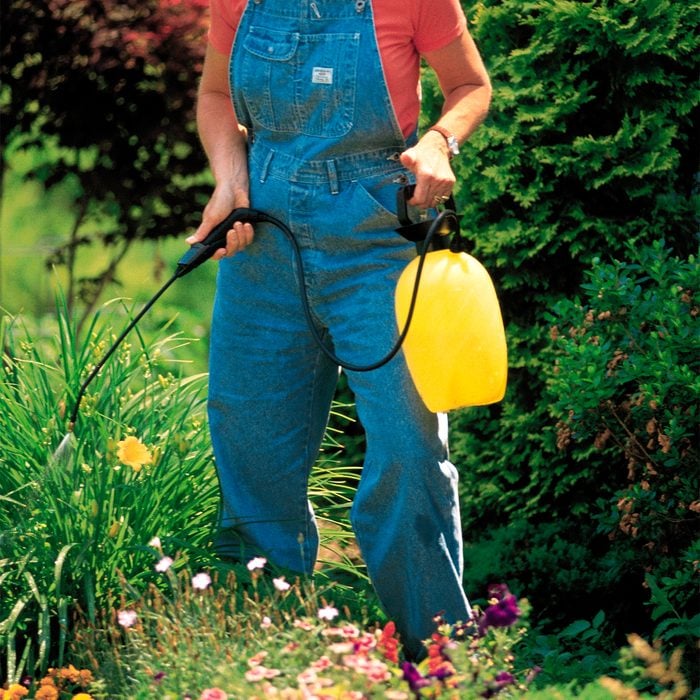
We talk with an expert about healthier choices for humans and the environment.
Our editors and experts handpick every product we feature. We may earn a commission from your purchases.
Undoubtedly you’ve read or heard reports about the toxic chemicals in herbicides and their long-term effects on us and the environment. As a result, environmentally friendly products with active ingredients like vinegar, salt, soap and essential oils are gaining in popularity.
With more organic weed killers hitting the market every growing season, I chatted with an expert about what they are and how they work.
On This Page
Meet The Expert

Heather Johnson is the lead horticulturist at Bachman’s Floral and Garden in Minneapolis, Minn., where she specializes in diagnosing and managing plant diseases in everything from turf to pine trees.
She discovered her love of gardening at a young age, which led her to a degree in plant biology from the University of Minnesota and a master’s in plant pathology from the University of California-Davis. Johnson says even in her spare time, she’s consumed by plants. “I currently have over 100 houseplants and spend a little time every day tending to them,” she says.
Choosing The Right Herbicide
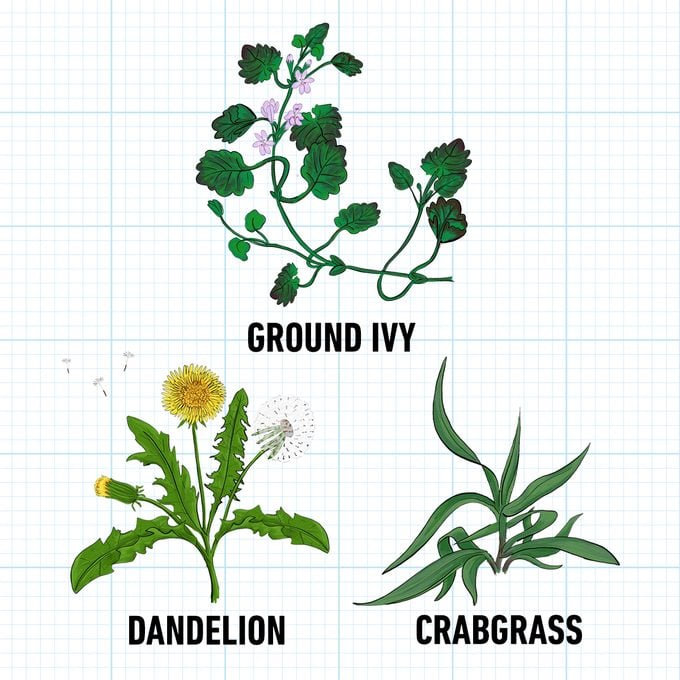
Whatever the time of year or the conditions, you can treat unwanted weeds or grass in environmentally friendly ways — from preemergent to post-emergent, selective and nonselective varieties. But read labels and choose products with care.
“A lot of the organic options are burn-down herbicides, meaning the roots will remain intact and be able to regrow new shoots later,” Johnson says. “[And] salt and vinegar can remain in the soil after killing the intended weeds, which can affect the growth of wanted plants in the area later on.”
To choose what’s best for your lawn or garden, Johnson suggests you start by answering these questions:
What Type of Weeds Are You Trying To Remove?
Common weeds Johnson say most homeowners struggle to control are dandelions, creeping Charlie and crabgrass. The first two are broadleaf weeds. “If your lawn is overrun with these, it’s more likely that the health of the lawn is being impacted, and lawn care besides just weed removal needs to be done,” Johnson said.
The crabgrass problem is so widespread that companies have developed entire lines of herbicides to eliminate it. Though toxic, these can be effective when used correctly. However, Johnson says, “same as with other weeds, if your lawn is overrun with crabgrass, then there are other health issues that need to be addressed.”
How Many Weeds Are You Targeting?
In cases where weeds haven’t overtaken the lawn or appeared in large clusters, Johnson prefers hand weeding with a tool. “It allows me to dig up the entire weed without the potential of damaging the lawn,” she says.
On the other hand, if the whole lawn is overrun with weeds, she suggests “reseeding along with testing the soil to understand the health of the grass and what nutrients may be needed to amend it.”
When Are You Applying the Weed Killer?
“Some weeds are best handled preemergence, and some weeds are best handled post-emergence,” says Johnson. “Crabgrass can be handled pre- or post-emergence, with the most effective time being preemergence, in April or May, to avoid harming the lawn.”
Broadleaf weeds are best handled post-emergence, she says, “as long as it’s before they flower and spread.” If you’re looking for more options to kill weeds, then here’s a list of weed killing plants.
Earth-Friendly Weed Killers Worth Checking Out
Espoma Weed Preventer Plus Lawn Food
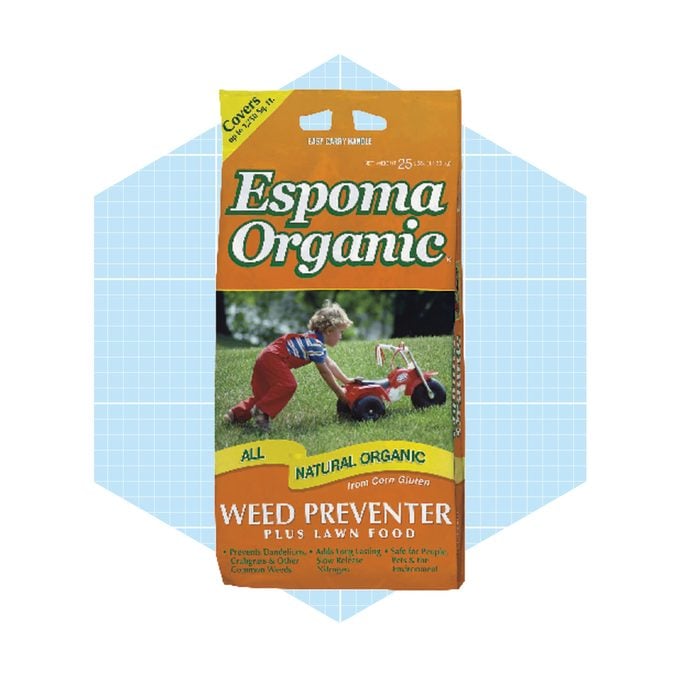
Espoma Organic Weed Preventer Plus Lawn Food is the best environmentally friendly product for established lawns. It’s made of pure corn gluten meal, so it’s safe for children and pets to play on even immediately after application.
Besides inhibiting weed growth, this product also feeds the lawn, ensuring it stays green and healthy. Johnson says organic and preemergent lawn products are “typically a fertilizer or germination inhibitor that won’t kill already established grass but will prevent any new plants from germinating.”
For best results, apply the Espoma Organic Weed Preventer twice a year, once in early spring and again in early fall.
A.D.I.O.S Selective Bio-Herbicide
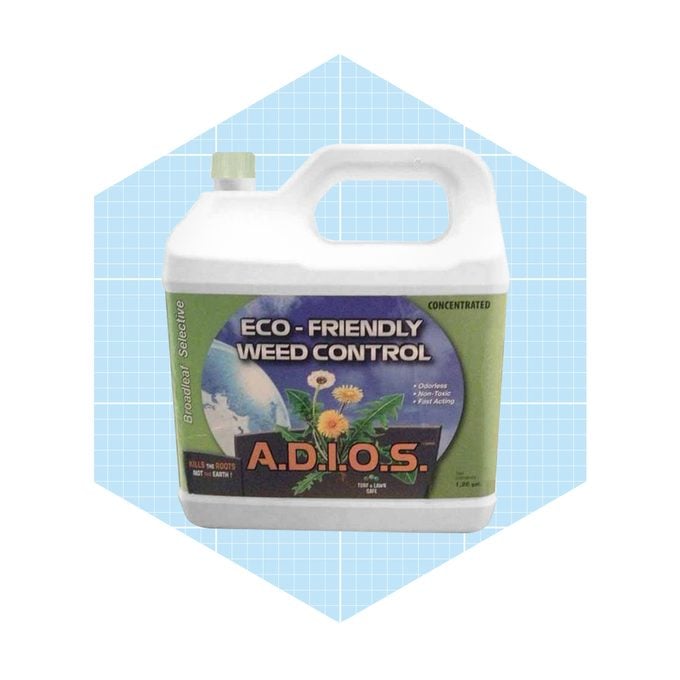
A.D.I.O.S. Selective Bio-Herbicide is becoming increasingly popular in parts of the United States where conventional herbicides are restricted. Salt, its active ingredient, can be used against broadleaf weeds like dandelions, creeping Charlie, and thistles.
A.D.I.O.S. meets all USDA organic standards and has been approved in commercial organic farming. But use sparingly. Overuse of salt-based products can negatively affect the quality of soil in the long run.
Green Gobbler 20% Vinegar Weed Killer
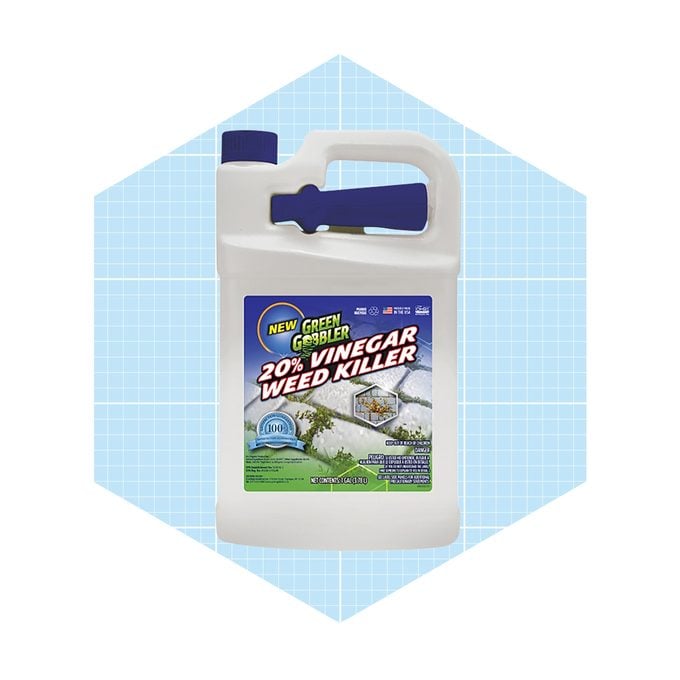
Green Gobbler 20% Vinegar Weed Killer is a potent, nonselective vinegar-based product. It’s made from ethanol distilled from corn grain and a concentrated vinegar containing four times the acetic acid of traditional household vinegar.
Biodegradable and nontoxic, this Organic Materials Review Institute (OMRI) certified formula will safely remove all types of weeds from driveways, sidewalks and mulch beds.
Most environmentally friendly weed killers must be sprayed directly on a growing weed so the active ingredients are absorbed. Johnson suggests using “nonselective sprays such as this in an isolated area, where it’s easy to target individual weeds.”
Make Your Own All Natural Weed Killer
A mixture of vinegar, salt and dish soap can be an effective spot treatment for weeds, according to Johnson. Concentrated vinegar works because it’s stronger than the household variety, usually at near 20% acetic acid.
The salt and acetic acid present in vinegar cause unwanted plants to dehydrate, wither and die. And the dish soap enhances the effectiveness by breaking down the plant’s outer layer (cuticle).
Mix one gallon of vinegar, one ounce of dish soap and one cup of salt in a plastic bottle and spray directly on weeds. Apply the mixture on a sunny day with no wind. Because vinegar-based products are nonselective weed killers, they will harm nearby plants if you don’t spray carefully. “If used in small amounts, this shouldn’t affect the soil long term,” Johnson said.
Eliminating Weeds Without Weed Killers
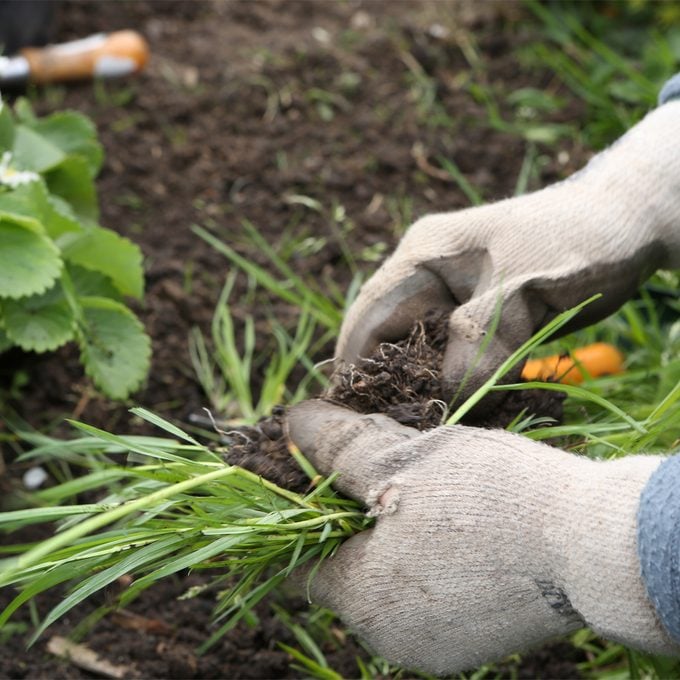
If you’re still feeling uneasy about using any weed killer, environmentally friendly or not, other means are available to do the job.
Try pouring boiling water on sidewalk, driveway or patio weeds. The water scalds the unwanted weed, and any runoff will cool on the impervious surface before it reaches other plants.
To eradicate weeds from nonflammable areas like cracks in sidewalks and gravel driveways, a propane torch is another effective alternative. Weeds growing on dry or combustible materials should never be torched. Nor should poison ivy or other poisonous plants because their smoke can cause serious allergic reactions.
For large areas of your yard, or between rows of vegetables in your planter boxes, consider solarizing or smothering the soil.
To solarize, place a transparent plastic tarp over the soil. The tarp prevents water absorption while heating the soil and ultimately killing all vegetation. To smother, place layers of newspaper or old shower curtains on the soil to block the sun and moisture.
One of the most effective ways to maintain a weed-free lawn is by following a lawn care schedule. Johnson recommends keeping a lawn calendar that outlines when to do each maintenance task, like mowing, fertilizing and thatching.
“Following those tips and hand-removing weeds when they are present is a good way to mitigate weeds without the use of any chemicals,” she says. If your lawn is more than 50% weeds, Johnson said it’s best to reseed the whole lawn.